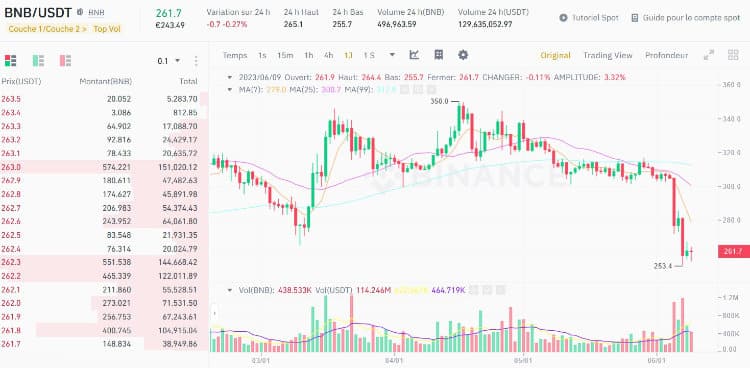Bitcoin trading: how does it work?
Bitcoin trading is the activity of buying and selling Bitcoins on exchanges such as Immediate Connect for the purpose of making profits. As you probably know, Bitcoin is a cryptocurrency that works on blockchain technology and does not depend on any state or bank. Having become popular because of its high growth potential, Bitcoin has become an asset on which “crypto-traders” bet. The goal is to bet up or down on Bitcoin. “Buy low, sell high” is the motto of traders of all kinds and this is once again the case with Bitcoin. The purpose of the maneuver is to buy low and sell when the price rises to earn a profit.

The keys to understanding Bitcoin trading…
Bitcoin trading involves different strategies and techniques to take advantage of price fluctuations. Here are some key things to understand about Bitcoin trading:
► Understanding volatility: Bitcoin price is known for its high volatility, which means that its value can fluctuate rapidly over short periods of time. This creates big trading opportunities for investors. While a stock market will rise or fall by a few percent over several weeks, Bitcoin can play a 24-hour roller coaster.
► Exchange platforms: bitcoin traders use online exchange platforms to buy and sell bitcoins. It is essential to choose a reputable and secure platform to conduct transactions.
► Market analysis: traders use technical and fundamental analysis tools to assess the Bitcoin market. Technical analysis is based on the study of price charts and indicators to identify patterns and trends. Fundamental analysis examines economic factors and news that can influence the price of Bitcoin: war, adoption of BTC by a country, ban on mining by a government, update of the blockchain, etc.
► Trading strategies: There are different bitcoin trading strategies, such as day trading, swing trading, and long-term trading. Day trading involves opening and closing positions within the same day, while swing trading aims to take advantage of short-term price movements over a few days. Long-term trading involves holding Bitcoins for longer periods of time in anticipation of an increase in their long-term value.
► Risk management: Bitcoin trading involves significant risks. It is crucial to put in place appropriate risk management, in particular by using “stop-loss” orders to limit losses and by diversifying your trading portfolio. You should also remember that it is not recommended to trade with your savings: only bet what you are ready to lose!
► Changes in regulations: Bitcoin and cryptocurrency regulations may vary by country. Traders need to keep up to date with regulatory developments and tax compliance. In France, for example, the rules have changed. While you had to pay 30% on capital gains, the legislation now allows you to shift your profits on a progressive scale. Non-taxable people will only pay 17.2%: that’s already better!
► The psychology of trading: Trading psychology plays a vital role in decision making. Emotions such as greed and fear can influence trading decisions. It’s important to stay calm and rational and not let emotions take over.

![[#BonPlan] The high-tech promotions of June 1 [#BonPlan] The high-tech promotions of June 1](https://cdn.kulturegeek.fr/wp-content/uploads/2016/02/promo-deals.jpg)
